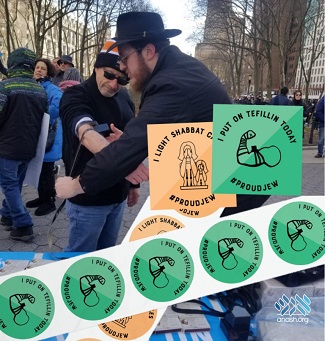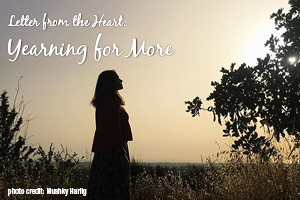In the Spirit of the Rebbe: Fighting Antisemitism by Spreading Prosemitism
By David Suissa
Rabbi Menachem Mendel Schneerson showed the world a Judaism that is hard to hate. Instead, he urged people to hit the streets to spread goodness and kindness. Prosemitism has the potential to be the antithesis of the apathy, confusion and disarray of Jewish unity that Antisemitism seeks to ignite.
In a world where we are all seeking to fight the rising Jew hatred all around the world, how can a common person make a difference?
As a longtime educator on the dangers of ignoring the trends of antisemitism throughout history, pro-Semitism has been the term I have used again and again as the crucial element to our ability to counter the effects of hate. Especially in an environment of such confusion over Jewish values “vs” humanistic values, this element of Jewish identity must be continuously emphasized.
One method of expression is being a Virtual Citizen of Israel, to engage continuously with matters relating to our Semitic peoplehood and our ancestral community of belonging, and to be ZionProud wherever we may be, however we may practice, and whatever challenges might lay ahead. Through Prosemitism we can indeed foster a Jewish unity based on our ancient heritage and rights that can pass from generation to generation.
As a member of the Chabad community of Potomac with the inspirational and passionate Rabbi Mendel Bluming and his incredible wife, Sara, I am proud to have the opportunity to shed light on the Chabad love for Israel in the spirit of the Rebbe.
Elana Heideman
We take it for granted that the way to address the evil of anti-Semitism is to fight it. It’s a natural part of our vocabulary. We fight, we confront, we condemn, we call out. We refuse to stand idly by. All of that makes perfect sense.
But on the anniversary of the passing of the Lubavitcher rebbe, Rabbi Menachem Mendel Schneerson, leader of the Chabad-Lubavitch movement, it’s worth reflecting on his approach to fighting the darkness.
You never heard the Rebbe call for protests or demonstrations. He never urged his followers to hit the streets to confront evil. Instead, he urged them to hit the streets to spread goodness and kindness.
I have met hundreds of Chabad emissaries over the years. Whether I’m speaking with an emissary in Bakersfield, Puerto Rico, Prague, Morocco, Costa Rica or Oxnard, it’s always the same message, the same question: “Can I get you to do a good deed today?”

Rabbi Danny Cohen of Chabad of Hebron and his son Shneor offer the lulav and etrog
A few years ago, I was walking in Ben-Gurion Airport, feeling especially guilty that I was missing the first night of Hanukkah, and thinking: Man, would I love to light a candle tonight. Of course, a Chabad emissary immediately appeared and asked me if I wanted to light. As grateful as I was for the opportunity, he looked even more grateful than I was.
If you want to understand Chabad and the power of the rebbe’s approach, multiply my story by a few million. Imagine thousands of emissaries in more than 80 countries spreading good deeds, day after day. It adds up to a lot of goodness.
It’s uncanny how any time you see a humanitarian disaster somewhere, there’s usually a Chabad emissary right in the middle of the rescue mission. It’s the Chabad way; they help out wherever they can, and these days they’re pretty much everywhere.
The Rebbe was hardly naïve. He was a man of the world, a scholar and philosopher, fully aware of the dark side of human nature. Maybe he saw that there were already plenty of groups fighting the darkness of anti-Semitism through the standard methods of confrontation and condemnation.
His movement would go in another direction, a direction more in keeping with who he was. It would fight darkness with light, hate with love, despair with hope. Did it work? Does it work? Does fighting darkness with light really change anything? Are there any metrics with which to measure this success?

Chabad doesn’t much worry about standard metrics. Its key metric of success is: How many people have we helped today and how many good deeds have we enabled? Maybe that’s the way love works. It doesn’t calculate. It just gives. This kind of love can be disarming. It’s hard to hate anyone who only wants to spread acts of goodness, even if it’s not your religion.
That was one of the effects of the Rebbe’s approach. By spreading the goodness of Judaism in such a visible, loving and global way, he showed the world a Judaism that is hard to hate. His approach responded to the virus of anti-Semitism with the gentle but potent force of pro-Semitism.
For all of us who believe in the crucial importance of fighting evil though confrontation and condemnation, we owe the rebbe a debt of gratitude for adding to the world his method of love, goodness, and kindness. Whether it’s “working” or not, it’s hard to imagine our world without it.
DISCUSSION QUESTIONS AND ACTIVITIES
- Watch a few videos from JEM here to get a sense of who the Rebbe was.
- How can you apply the Rebbe’s Ahavas Yisroel (love for Jewish people) to the actual state of Israel? Can the Rebbe’s love for every Jew can extend to the world’s only Jewish state?
- The Rebbe famously taught that Israel is the safest place in the world for a Jew. How can you express your gratitude to the leaders, soldiers, and citizens who make Israel into a safe haven for the Jewish people?
- The author explains the positive ‘pro-Semitism’ that the Rebbe used to fight against antisemitism. Think of ways in which you can fight anti-zionism with ‘pro-zionism’. Talk to people about the great technological accomplishments of Israel, how the country is a model of diversity, and Israel’s status as a beacon of democracy in the Middle East.
- The author mentions that “Chabad doesn’t much worry about standard metrics. Its key metric of success is: How many people have we helped today and how many good deeds have we enabled?” Think about how many people you have helped today, and use that as a measure of how successful your day has been.
- Honour the Rebbe’s legacy by putting on tefillin, putting up a mezuzah, learning Torah, or giving tzedakah today. You can also do all of these!
Recommended for you:
About the Author









